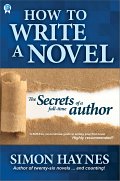How to build an author website
If you're putting together a website to promote your work, don't forget that you're also giving people an impression of yourself. If your website is a disorganised amateur effort, people will assume your work is the same. Totally unfair, but that's life.
I'm not a professional web designer but I do know a crappy site when I see one. Maybe mine isn't all that special, but it's caviar and champagne on ice compared to some - and I'm not talking about a few simple pages knocked out in Publisher. The worst offenders are sites locked to a certain resolution (e.g. 800x600), which look like picture postcards in the middle of my 1400 x 1050 screen. (There's no problem with fixing the width to 800, as per the page you're reading now, but at least do something with the borders outside.) There are sites designed around a fixed font, and when you increase that size they look like someone sneezed into a scrabble box. Or they have glitzy little navigation buttons which look like someone took an envelope and shrunk it to the size of a stamp. Others are so heavy on flashy graphics and animations it's a ten minute wait for everything to load ... and I'm on fast broadband.
Remember - websites can be displayed on any size screen. To test yours, try the smallest and largest font sizes in your browser (both IE AND Firefox) to see what happens. If you have a very large screen, resize the browser window to roughly 800 x 600 to see what the site looks like. Yeah, that bad.
The start page
For your home page I recommend a cover shot of your current book, a brief summary of yourself and your work, and navigation links to your other pages. How you arrange it all is your business, but links down the left are traditional. If you're doing it all yourself, check out css files to simplify the design and allow for quick makeovers.
What else should your site have?
Try a page for each project you've been involved with, whether non-fiction articles or stories in a magazine or a collection of short fiction you helped to edit and publish. List all the story titles, the contributors and the publisher, with links to everything. Not only will your page get indexed by Google, but some of those people will link back to your site when they receive visitors from you. (The cluey ones will, and you have to be cluey in this game.) It doesn't matter how old the project is, the more info you provide the more search engines will love you.
Other things?
I remember a blog post by Jonathan Strahan where he was begging authors to include a press page on their site. You don't need much: An author photo, a cover shot and downloadable press release for each book, your bio and your bibliography. Put them all on their own page and label it 'Press Material', then provide a nice clear link to it.
A word about personal information
Ask yourself what an agent, a publisher, or your current or future employer might think when reading your site. Details about your after-hours hijinks at work or the way you use their lasers to run off fifty copies of your manuscript might be entertaining, but they're better left to your blog. And if your blog is controversial, edgy, in-your-face, whatever, maybe you shouldn't link to it from your website.
If that sounds dull and stodgy, bear this in mind: When schools are debating whether to bring me in for an author visit, my publisher sends them to my website. What would they think if my site was crammed with sordid tales of weekend debauchery? (That'd be fiction anyway, since I don't drink.)
You might not care about schools, but your site may also play host to industry professionals, to reviewers and reporters, and to readers of your books. Address yourself to them, not those hanging out for tidbits from your private life.
What about design?
Let's talk about business cards for a second. You can get glossy, professional ones or you can run off a batch on an inkjet and cut them up with a pair of scissors. If you were chatting to a top literary agent at a convention, which sort of business card would you rather press into their hand?
Websites are no different, except that you're not there to explain it's just a temporary site while your other one is being put together. Worse, people form an opinion of you and your work before the page has even finished loading.
Your site doesn't have to be flashy and it certainly doesn't have to be expensive, but it should look professional. You want your visitors to refer others, and the only way to be sure of that is to give them a site they'll be happy to recommend.
Generating Traffic
There are endless books and websites devoted to this topic, so I'm not going to cover it much. Links from other sites are the single most important factor, which means providing content for them to link to.
Please remember that none of my articles are meant to discourage. In fact, they're all written for the me of ten years ago, the writer who was ready to take the next step but didn't know what that step was.
About the author: Simon Haynes is the author of over 25 novels. He also designed and created
yWriter.
Stay in touch!
Follow me on
Facebook or Twitter
